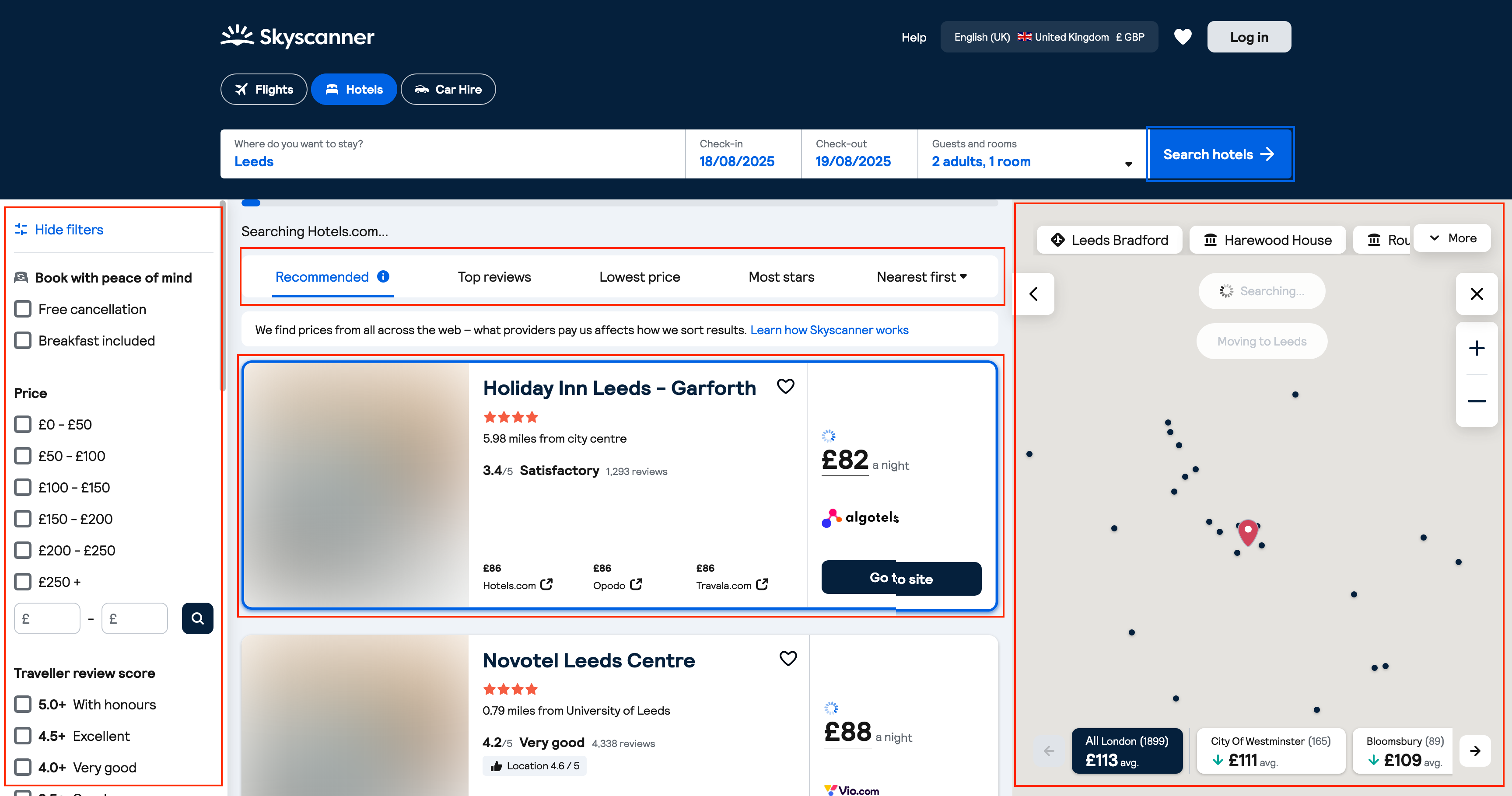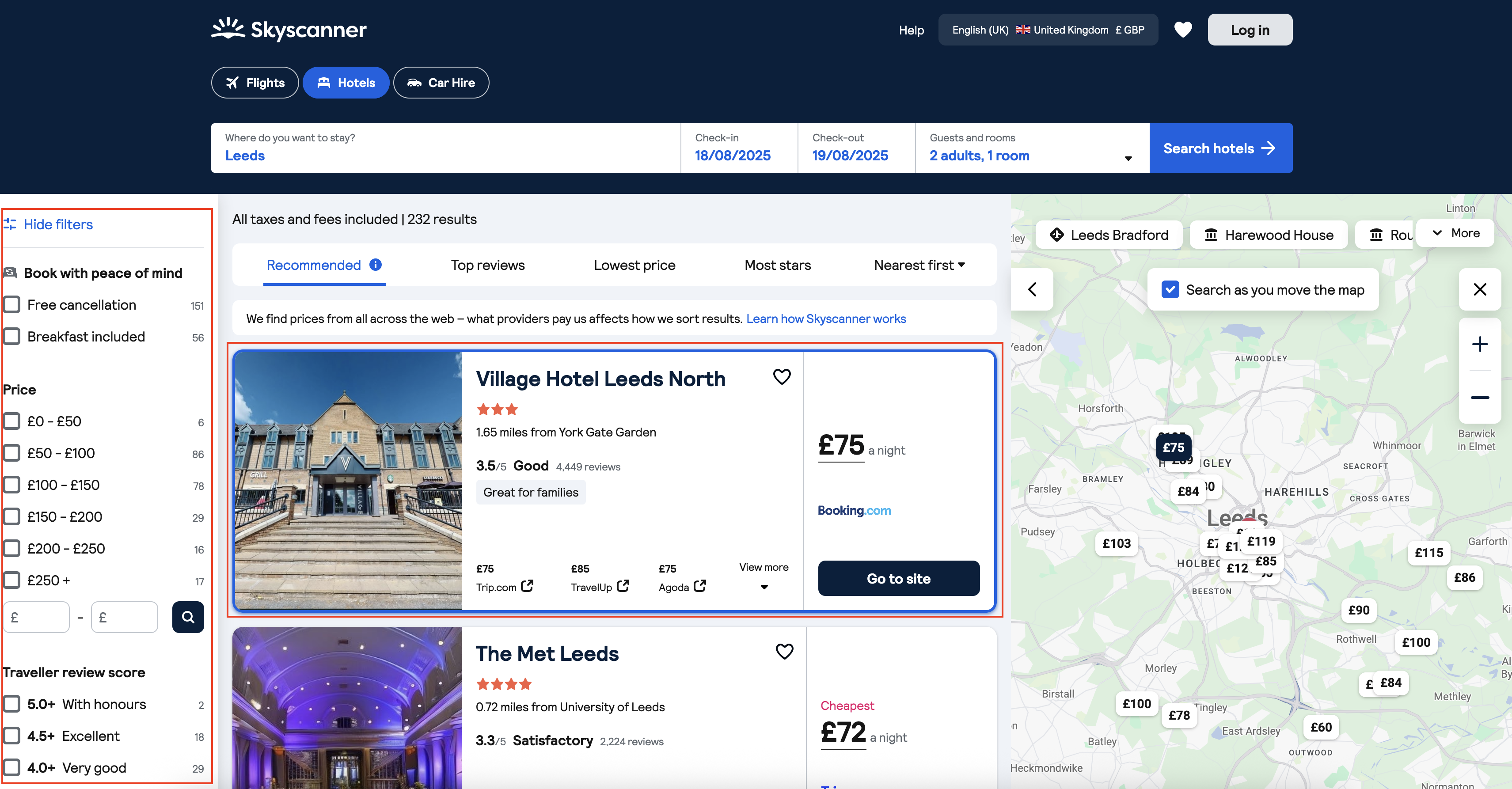Overview
Introduction
The Hotels Live Prices API is used to search for and return hotel offers for any time window from the current day until one year from the current day.
The API takes a location entity ID, check-in and check-out dates, and basic traveller information, and returns a list of pricing options that will be bookable by travellers.
Terminology
Throughout the documentation, you'll see the use of various terms. To eliminate uncertainty, here's a small explanation to establish the distinction between them.
| Term | Description |
|---|---|
hotels | Hotels are accommodation properties that offer rooms or stays |
agents | Agents are supply partners where the offers are retrieved from. These can be OTAs, hotel chains, or groups. Within the documentation they can also be referred as supply partners. |
pricing option | An offer from a specific agent for a specific hotel. An agent may return multiple pricing options per hotel (e.g., different room types, board plans, or cancellation policies) but Hotel Live Pricing API will return only the most basic one that satisfies the applied search query and filtering criteria. Also referred to as offers. |
Core concepts
| Term | Description |
|---|---|
session | The /create request is used to initiate a new search session for a given hotel search query. It returns a session token that is reused on every subsequent /poll request. The session token keeps state between /poll requests, enabling stable pagination. All sessions are time-constrained and can expire. |
pagination | To keep responses lean and fast, pagination controls the amount of hotels to return for each API call. Responses include the total hotel results count so you can build reliable paging. |
sorting | The API returns sort scores which you can apply to order the items within the UI. The API provides scores for both hotels and pricing options within each hotel. You can specify the sorting order type and direction for hotels. However pricing options sorting options are not configurable. |
filtering | Hotel filters (such as star rating, price ranges, amenities, etc.) run on the server. Apply them on the /poll request to keep the result set consistent across pages. Client-side filtering is not recommended. |
How we use it at Skyscanner

To provide the best UXE, our APIs are asynchronous, meaning that once the Search is created (CreateSearch), a set of predefined filters and sorting orders are rendered in the UI. Values for some filters, such as hotel chain names, groups, and agents, will be dependent on the actual data returned, which will be built during the polling process.
The prices, along with the hotel's details and room characteristics, are loaded asynchronously. As results are loaded, the results in the centre are populated with the available offers as they are received from our supply partners.
This asynchronous behaviour is achieved through polling calls. Each polling call checks for available results and returns them directly to the client, with the option to apply additional filtering or sorting conditions.

The polling made by the client should be active, meaning that the client will have to make multiple requests to receive all the available offers and data info. The API returns results as soon as they are received. It's expected to take between 1 and 10 seconds to get the full set of results.
The above screenshot captures what you can build, including some example data points. For example pricing options are grouped based on the hotel that they're for.
👉 Here you can try out a search on your own.
Legal disclaimer on content availability
Skyscanner maintains contractual agreements with various supply partners that restrict our ability to distribute certain pricing information and content through our API services. As a result, the content and pricing available through our APIs may differ from what is displayed on skyscanner.net. As a result, certain pricing options will not be available as part of Skyscanner's Hotel Live Pricing API and review summaries will display average rating and number of reviews only.
Endpoints
This API has 2 endpoints, /create and /poll.
/create
POST https://partners.api.skyscanner.net/apiservices/v1/hotels/live/search/create
/create is used to initiate the session. In most cases, the response will not include any results. However in some cases it will return pricing options for up to the specified initial page size amount of hotels.
/poll
POST https://partners.api.skyscanner.net/apiservices/v1/hotels/live/search/poll/{sessionToken}
/poll is used to retrieve the complete list of results. This usually takes some amount of time as our backend makes
calls to our full list of supply partners for offers. The /poll endpoint is invoked with a sessionToken which is
returned in the result of the /create call. Note that the despite taking some seconds for the API to fetch all the
results the calls to the /poll endpoint are rapid. The /poll endpoint is designed to
be called repeatedly until the status field in the response is set to completed. After all results become available, you will be able to navigate through all results via pagination, or apply desired filters and sorting.
The sessionToken is time-bound. Session duration can vary but is no longer than 15 minutes. After a session expires, the API will return the following 400 response:
Session token is expired or invalid
If the token is expired, you should use the /create endpoint and initiate a new session.
Request
/create
Required fields
Requests to the /create endpoint need to contain the following:
| Field name | Description |
|---|---|
market | Market where search is coming from. E.g.: UK |
locale | Language to be used for the search. E.g.: en-GB |
currency | Currency that the search result prices are returned in. E.g.: GBP |
entityId | Place entity id (i.e. Hotel, City, Nation, etc.) |
checkinDate | Date of check-in |
checkoutDate | Date of check-out. Must be at a later point than the check-in date. |
adults | Number of adults. Should be greater than or equal to 1 |
initialPageSize | The number of hotels to return pricing options for. This should ideally be the amount of hotels that each page would have in your UI. |
rooms | Number of rooms to book |
Optional fields
Below are additional optional fields to modify the outcome of the request:
| Field name | Description |
|---|---|
childrenAges | List of children ages |
includedAgentsIds | Options for search result to only include offers from specified agents. |
excludedAgentsIds | Options for search result to exclude offers from specified agents. |
/poll
POST https://partners.api.skyscanner.net/apiservices/v1/hotels/live/search/poll/{sessionToken}
The sessionToken comes from the /create endpoint response. It is used strictly only in the URL path.
Required fields
Requests to the /poll endpoint need to contain the following:
| Field name | Description |
|---|---|
pagination | Required to navigate results on page-by-page basis. Specifies the limit and offset (page size and cursor). Please use the formula offset = pageIndex × limit. To provide best experience possible you should always re-start from page 1 after changing filters or sort. |
Optional fields
Below are additional optional fields to modify the outcome of the request:
| Field name | Description |
|---|---|
filters | Specifies any filters to be applied to the current search query. For example adding a FREE_CANCELLATION filter will make sure that all returned pricing options include a free cancellation policy. |
sort | Specifies the sort criteria to be applied. This sorting preference is applied only to the hotels. The sorting of pricing options is not configurable. Please refer to How sorting works section below for types & direction of sorting available to hotels. |
When changing filtering or sorting on /poll, treat it as a new result stream:
request page 1 first, then continue paging (page 2, page 3, …) as needed.
Check the API reference for additional detail.
Response /create and /poll
Each /create or /poll response includes a status, the total hotel results, an agents map, the current page of results, and sorting metadata (score maps). While results are still streaming, some fields may be empty or partially populated. Continue polling until status is completed to retrieve the complete result set
How sorting works (hotels vs. pricing options)
There are two independent sorts returned in the response, each with a score map you apply on the client:
Hotels (configurable) - you choose type and direction in /poll. The response echoes these and returns a score list you use to order hotels.
-
Direction:
ASCENDING- lowest to highestDESCENDING- highest to lowest
-
Type:
PRICEGUEST_RATINGPROXIMITYSTAR_RATINGDISCOUNTBEST
A full list of available sort types are documented in the Poll API reference.
Pricing options (not configurable) - always type: BEST, direction: DESCENDING. The response returns scores to order options within each hotel. BEST is a ranking devised by Skyscanner's internal algorithm, which uses a variety of factors (price, reviews, popularity, etc.), resulting in an well-rounded assessment.
For more details on how to interpret the values received in the price field, please consult the API reference.
Fields
| Field name | Description |
|---|---|
status | The status of the search request. For example running or completed |
totalHotelResultCount | Total number of hotels within the results for the actual session and the applied filters. |
agents | Information about the agents referenced in hotelsPricingOptions. |
hotelInfo | Hotel information related to the search. For example, it will contain how far the hotel is to the location from the search query. |
hotelContent | Static information about a specific hotel such as name, star rating, etc. |
sortOptions | Hotel and pricing option sorting score maps, and also the applied sorting type and direction. |
Check the API reference for additional detail.